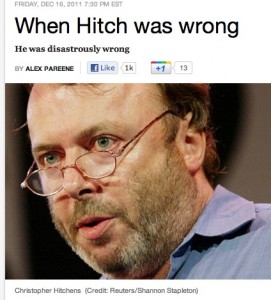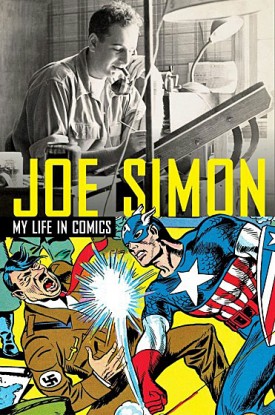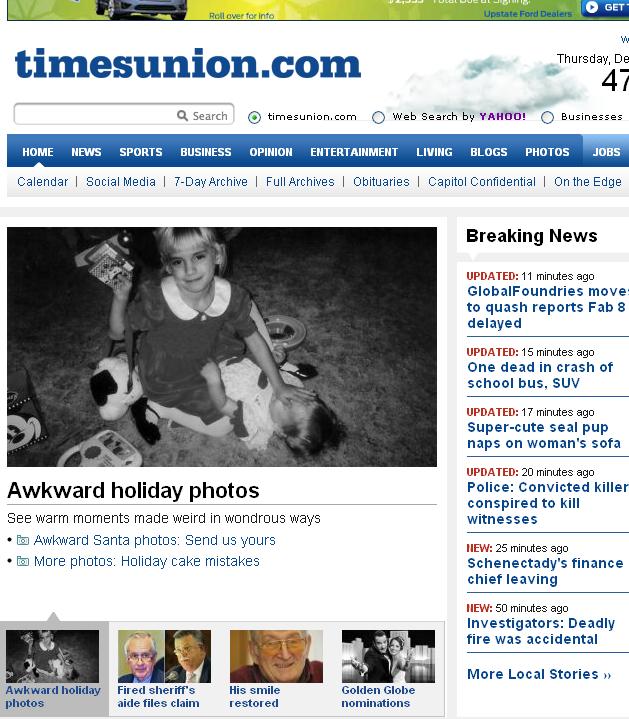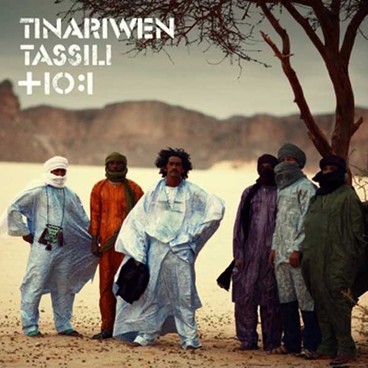Arrests have finally been made in the ballot fraud case in the city of Troy, the culmination of a two year investigation that feels like it has dragged on forever. The arrests include the sitting City Council President, Clem Campana, who in light of the scandal dropped out of the 2011 Mayoral race which was subsequently won by replacement candidate and local business owner (re: non-politico) Lou Rosamilia.
Campana pleaded not guilty Tuesday to felony charges of first-degree falsifying business records and illegal voting and a misdemeanor count of conspiracy to promote or prevent election. Campana, who is free on his own recognizance, ended his campaign for mayor in mid-July.
The final and lesser charge comes with 10 pages of supporting evidence that names 49 voters whose absentee ballots were altered to vote for Democrats running in the 2009 Working Families Party primary. Most of the voters lived in Troy Housing Authority apartments and were unfamiliar with the voting process.The supporting evidence lists 29 instances and dates of illegal activities, which exposes Special District Attorney Trey Smith’s two-year investigation against the officials. The second grand jury investigating the case is still active.
Read more: http://www.timesunion.com/local/article/Ballot-case-papers-hefty-2418256.php#ixzz1hE4ed4sT
The attitude in many circles has been to downplay what I, in my naivete and own cynical apprehension towards the political process, view as reprehensible. Whether it’s a race for national office, a judgeship, or a municipal seat, I can’t help but feel betrayed by any elected official who would assist in casting so much as a single fraudulent vote in order to sway the outcome of an election.
If you ask a group of people what it means to be an American and what the country’s core values are, you will hear a litany of answers. Some will be similar but have different wording; some will wildly differ or even conflict with others. But I still believe that there can’t be any argument that one of those core principles is the simple belief of representative democracy and the need to maintain the integrity of the voting process.
It is bad enough that politicians often express disingenuous views and intentions in order to obtain elected office, but that is an unavoidable aspect of politics and life in general. Sometimes people disappoint you and, admittedly, sometimes concessions have to be made in order to get things done. But voter fraud is, in my mind, an inexcusable betrayal of one of the very, very few things that we can all conclusively hold dear regardless of our political, social, or cultural leanings. And though those currently accused and those who have slipped through the cracks would downplay the severity of it or even crack jokes with reporters in downtown establishments about their alleged involvement in the crimes, I personally view voter fraud as being not just akin to, but literal, treason. And I wish it was pursued as such.*
* Disclaimer: Before anyone gets in too big of a tizzy, please note that I oppose the death penalty.
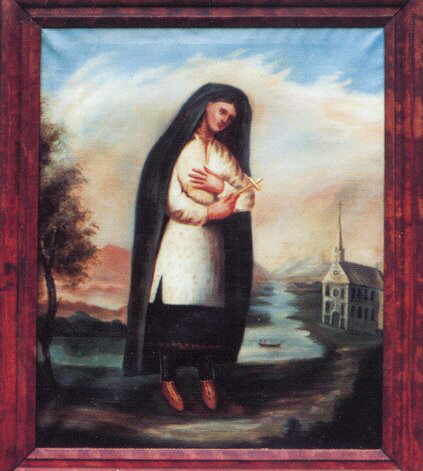
Kateri Tekakwitha, who emigrated from the Mohawk valley to Quebec after her conversion to Catholicism, was recently canonized by Pope Benedict. But her canonization raises some troubling questions of faith, race, and gender.
I just read a Times Union piece by Cathleen Crowley about the canonization of Kateri, a 17th Century convert to Catholicism who is being put on the fast-track to Sainthood after an alleged miracle out West.
Kateri Tekakwitha was born out of conflict. Her mother was an Algonquin and a Christian; her father a chief in the Mohawk tribe who did not make the conversion. But when she was only four years old, the entire family was stricken with a wholly different and far less glamorous European import: the smallpox virus. It took the lives of both parents and left the young Kateri with permanently impaired vision (her surname was adopted from her Mohawk name which loosely translates to “she who walks into things”) and scars.
When she was twenty years old she converted to Catholicism and, after refusing to marry due to her newfound faith (or was it the other way around?), escaped across the border to Canada. She found refuge in a settlement near Montreal consisting of converted Natives from the region, assisting with aid for the sick, poor, and dying while also dabbling in missionary work. Yet while engaged in the social aspects of her faith, she was also a bit of a recluse. She lived in the woods and was considered a mystic, which would have been acceptable to converts but I’m sure did not endear her to white, European Catholics which while more pagan than their Protestant counterparts still frowned upon the retention of Native customs.
Kateri died when she was only twenty-four. Believers claim that when she died, her body became engulfed in a spiritual aura and the scars from her childhood illness disappeared from her face.
Here’s where things get a little murky.
Continue reading »
One of my family’s most cherished holiday photos is of me and my sister each sitting on a knee of the Santa Claus that used to occupy the Uncle Sam Atrium, back when it was a miniature downtown mall with its own movie theater rather than what it is today: a hollow glass monstrosity housing state workers and a CVS.
In the photo, my sister has a shit-eating grin on her face because I, at the age of two, had my mouth and eyes wide open in mid-scream as thick streams of tears poured over my bright red cheeks. Although the photo is decades old, the last time I saw it those tears were as clear and fresh as they day they fell. I’m pretty sure the photo actually cries like a South American statue of the Virgin Mary.
When my sister brought my nephew Joey (who turns two years old in February) to see a less than friendly St. Nick at the Lights in the Park in Albany, he had the same reaction. They did not take a photo, saving him the shame of twenty-nine years of jokes and mental scarring.
Laugh if you will, but can you blame us for our reaction? Claus is a loud, aggressive, hairy, unkempt fat man who wears the same sweatsuit every day. And he breaks into peoples’ houses. Santa isn’t magic, he’s homeless and desperate. He’s the guy I avoid making eye contact with at the bus stop.
My nephew Caden, on the other hand, did not cry. A very empathetic and observant toddler, he instead held his own and stared down the cruel Christmas tyrant. The photographic evidence:
What’s telling is not just Caden’s expression but that of his father (and my brother), Jack. They will sit with this madman, but they will not pretend to be appreciative of his company. And Jack, like me, remembers. He remembers, Claus.
So this, likely my penultimate Christmas post, goes out to my little nephews Caden and Joey, who will be having their first Conscious Christmas (that’s what it’s called when your kid is smart enough for the first time to realize he’s getting presents – start using it often) this year. Merry Christmas, you brave young souls, you princes of Troy, you Kings of New York.
And congratulations to Caden who, this year, becomes the first male toddler in three (four?) generations of Marshalls not to burst into frightened tears at the sight of Santa Claus.
Let me first make one thing clear: I disagreed, from the beginning, with Christopher Hitchens’ view on the War in Iraq. Firstly, there are the political concerns. For as much as we were culpable in our foreign policy blunders throughout the previous decades (cue that infamous photo of Rumsfeld gifting Hussein a rifle), we could not and would not be seen as righting a wrong by entering the country without the support of the UN Security Council and engaging in a grand upheaval and reconstruction in our own image. Even if it had been done correctly (the prevailing ignorance in the White House at the difference between Shiite and Sunni and what that meant for nation-building in Iraq doomed us from the start), our actions would be seen not as altruistic but as unrestrained hubris.
Then there is the moral justification. Hussein was undoubtedly a madman and a tyrant, but for every Hussein there are three or four Idi Amins. This is not to give a pass to the man and his two terrible sons. The regime, from its very inception, was built on violence, terror, and oppression. However, there are and continue to be far worse evils perpetuated throughout the world, yet all we offer to those despots – if we’re feeling particularly noble – is a carefully worded chastisement of very specific transgressions. Why do we and why should we take a high moral stand against a Gulf dictator and say nothing as entire peoples in places like Rwanda and the Sudan are wiped off the map? The answer, sadly, is that we place more value on inanimate black fuel deep under the Earth’s crust than we do the living, thinking, feeling black people above it. So to say we had a moral obligation and use high rhetoric to paint a lesser evil as the devil incarnate is, was, and always will be bunk.
You may wonder why on Earth I’m writing about a very specific area of contention with Hitchens so long after the fact. It’s because articles like this recent piece on Salon.com have popped up in the days following his death.
I think he would’ve been disgusted to see too much worshipful treacle being written about him upon his untimely death, so let’s remember that in addition to being a zingy writer and masterful debater, he was also a bellicose warmongering misogynist.
In case you didn’t know, we never would have gone into Iraq if Hitchens hadn’t supported the idea. Of course, that seems ludicrous, and overstating things a bit. And yet here is the piece’s author, Alex Pareene, to beat the point to death:
There was always something cartoonish about old “Hitch” the rakish intellectual character, puffing away on cigarettes and slurring bon mots in interviews, penning furious denunciations of hypocritical public figures while hosting salons and drunken parties at his Washington, D.C., apartment that some of the most powerful and prominent people in the world of politics and media attended. But his most monumental public crusade had devastating consequences that he never fully grappled with.
It would be charitable to describe Hitchens’ rhetoric as blustery and exaggerated, just as it would be charitable to call Pareene’s condemnation of an imaginary deification of the man laughably absurd.
Other than the suggestion that Hitchens’ support helped drive us into Iraq (what total fucking nonsense!), Pareene tries to paint him as an opportunist who became famous only after the fact. This man actually believes that Christopher Hitchens, world renowned writer and essayist, was famous because of his controversial stance on the Iraq War, rather than the idea that his stance on the Iraq War became infamous because of who he was.
Continue reading »
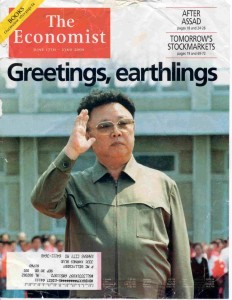
The death of Kim Jong-Il brought no shortage of jokes online, but the potential threat that a destabilized nuclear power poses is dire.
Myself, along with many others on Twitter, exploded in a barrage of jokes and puns upon learning of the death of North Korea’s despot and l’enfant terrible, Kim Jong-Il.
The country’s state media reported his death late Sunday night, citing “physical exhaustion during a train ride.” With the Kim Family Regime’s history of outrageous claims and deification, the awkward wording was met with scoff, ridicule, and no shortage of skepticism in the West. The phrasing, however, is awkward only because of the rushed translation, which even given more time and examination would still read a bit clumsy. But the stranger aspect of it is that they would openly and publicly admit that Dear Leader, whose declining health they steadfastly denied in recent years, came to such an anti-climatic end.
Despite all the ridicule and references to his puppet portrayal in the film “Team America: World Police,” there is at this time a barrage of late night phone calls, conferences, and meetings occurring in Washington, D.C. and throughout the world. That’s because an unstable country with a military force of at least 1.2 million soldiers that also possesses nuclear warheads has suddenly lost the charismatic figure whose worship was the central unifying force behind the regime. Kim Jong-Un (the youngest of his three sons) has been named as predecessor by the state media services, but there is some doubt that all will fall in line without some shaking up of the status quo. The KFR is not a royal family ruling by mandate of heaven. It was a regime built on the personality and perception of a single man that never really existed, and who is now dead.
Five years ago, The Atlantic reported on increasing tensions in the region and the problems that a destabilized North Korea posed:
And that may be reason to worry: totalitarian regimes close to demise are apt to get panicky and do rash things. The weaker North Korea gets, the more dangerous it becomes. The question that should be of greatest concern to the U.S. military in the Pacific—and the question that will likely determine the global balance of power in Asia for generations—is, What happens when North Korea collapses?
Much has changed in the world since this article was written in 2006, but not the danger posed by a regime change in North Korea. It’s worth our time to pour over documents like this and in the coming days, weeks, and month, keep an eye on the East.
Christopher Hitchens in Quotes from The Telegraph. One of my favorites, on cats and dogs:
[O]wners of dogs will have noticed that, if you provide them with food and water and shelter and affection, they will think you are god. Whereas owners of cats are compelled to realise that, if you provide them with food and water and shelter and affection, they draw the conclusion that they are gods.
Obituary from The Guardian
Ta-Nehisi Coates in his blog for The Atlantic: …I remain grateful for having studied at Hitchens virtual foot. I would salute his ascent into Valhalla. But I think that just be defiling a warrior’s grave.
Abbas Raza on Hitchens: “It has become normal in some circles to always preface any profession of admiration for Hitchens (and anyone who doesn’t admire him in some way or other is a rotten Philistine in my not-very-humble opinion) with something like, “I don’t agree with some of his political views, but…”, as if it is normal to agree with public intellectuals of prodigious output 100% of the time. This just irritates me.” Speak it, Abbas.
Christopher Buckey’s Postscript in The New Yorker: The jacket of his next book, a collection of breathtaking essays, perfectly titled “Arguably,” contains some glowing words of praise, including my own (humble but earnest) asseveration that he is—was—”the greatest living essayist in the English language.” One or two reviewers demurred, calling my effusion “forgivable exaggeration.” To them I say: O.K., name a better one. I would alter only one word in that blurb now.
VIDEOS:
Continue reading »
Today we mark the passing of two of the greatest contributors to Western culture in the last century. It’s a sad day, truly, for anybody who challenges, thinks, or otherwise acts outside the confines and constraints of a group consensus or conventional mores.
Joe Simon, born Hymie Simon, was a young Jewish artist from Rochester when he became the very first editor of Timely Comics, which would go on to become Marvel Comics and spawn an empire. His work with the legendary Jack Kirby is well documented, but he’ll be remembered most for his most colorful creation: Captain America, the World War II hero who would eventually be brought back by Marvel decades later and spawn further series and a blockbuster film franchise. With the Americans still rooted in isolationism and a full year before the bombing of Pearl Harbor forced the hand of the American government, Simon and Kirby went on the offensive and posted the iconic image of Captain America socking Adolf Hitler in the jaw.
Simon was the last great vestige of what’s heralded as the Golden Age of comic books. Simon was 98.
============
I’ve written before of my admiration for Christopher Hitchens. Just a few months ago, I wrote “if you don’t love the man’s writing even when you disagree with him then I don’t want to know you.” I still hold to that.
I can’t, and wouldn’t deign try to, write a tribute to the man that would surpass his own words. From the June 2011 issue of Vanity Fair:
My chief consolation in this year of living dyingly has been the presence of friends. I can’t eat or drink for pleasure anymore, so when they offer to come it’s only for the blessed chance to talk. Some of these comrades can easily fill a hall with paying customers avid to hear them: they are talkers with whom it’s a privilege just to keep up. Now at least I can do the listening for free. Can they come and see me? Yes, but only in a way. So now every day I go to a waiting room, and watch the awful news from Japan on cable TV (often closed-captioned, just to torture myself) and wait impatiently for a high dose of protons to be fired into my body at two-thirds the speed of light. What do I hope for? If not a cure, then a remission. And what do I want back? In the most beautiful apposition of two of the simplest words in our language: the freedom of speech.
That you had, that you championed, and for that you’ll always be remembered.
So long, Hitch.
Just some of the stories today that impact your life:
- The grand jury in Troy’s ballot fraud case is in its final stages.
- Applications for unemployment in the region have hit a three-year low.
- In light of controversies at Penn State and Syracuse, Governor Andrew Cuomo is set to introduce legislation that would designate more High School and higher ed personnel as mandated reporters of abuse.
- Cuomo’s Ethics panel comes under fire after a Dem appointee got through that represented a legislator that threw hot coffee in an aide’s face, amongst other infractions.
- Two convicted killers had hits out on witnesses in their trials in Schenectady.
- The Justice Department has accused an Arizona sheriff of unlawfully detaining Latinos.
Big stories. Big news.
Top story on the Times Union website?
AWKWARD HOLIDAY PHOTOS! Also, hot late-breaking news: “super-cute” seal pup curls up on a couch in New Zealand, a story that went viral yesterday morning.
Oh, and the kicker? The slideshow they link to lets us know that they basically are just reproducing pictures from the site Awkward Family Photos, so it’s not even original content. Plus, the photos that they used in the slidewshow aren’t recent submissions. Some of them have been on that site for ages. Oh, and their link to Awkward Family Photos itself is broken because whoever wrote it failed to add that important “http://” at the end of the link.
Here’s the thing: there’s no shortage of very good, hard-working reporters working for local newspapers. But they are obscured and buried by an editorial staff that is woefully out of touch (their new printing press is sure to catapult them into the 20th Century) or, even worse, sacrificing the integrity and dignity of their brand for the sake of a few hundred more clicks from people who want anything but news from a news site.
Meanwhile, the only other outlet for local news has pop-unders and God knows what else at their site and has some embarrassingly severe issues with copy editing.
Guys, can I just get some fucking news? Please?
Here’s how we’re going to do this: I’m going to pick ONE to be album of the year, then the other 19 are going to be listed in no particular order.
The problem with lists is that art is not an empirical set of values. It can’t be quantified, unless you’re ranking by number of units moved, which is not the purpose of year-end lists. It’s one thing to measure artistic and creative worth, but in terms of ranking them? It’s simply not possible. I think most that compile these lists understand that to an extent, but most people I see reacting to them don’t, and as such you get people very worked up over what is essentially a random placement determined by an imaginary set of criteria. So I won’t even try, except to say that one album in particular moved me more than any other.
At the end of this post there are links to purchase from Amazon via mp3, some of which are as low as $3.99 (ridiculous!). Also, if you have Spotify, I’ve compiled a playlist of all 20 albums. Please note that Gillian Welch’s album is not available on Spotify.
ALBUM OF THE YEAR:
Tinariwen – “Tassili”
download mp3
Touareg journeymen and former rebels bring their secluded yet strangely familiar music to the United States in this release from Anti- records. With the help of TV on the Radio’s Kyp Malone and Tunde Adebimpe, the nomadic musicians play infectious desert blues whose roots are speculated to share common ancestry with the early blues music from North America that hadn’t even reached their ears until after the group had already gained notoriety.
I initially sung their praises back in September:
It’s not enough for me to say that “Tassili” is the most fascinating record I’ve heard in years. It has, rather, reignited an appreciation for the role of music in our lives and culture. And by “our” I mean all of humanity, from the young frustrated American teenager growing into a counter-culture sensation to the orphaned child in the deserts of Mali who grows to become a warrior that yearns for peace.”
READ MORE: From the blood-stained sands of Mali and Algeria, the familiar and fascinating music of Tinariwen (September 8th, 2011)
To qualify that hyperbole, I still find after all these months that only a handful of days goes by before I’m back listening to this record, trying earnestly to suppress it as background music and instead becoming engrossed once again by that hauntingly familiar sound.
==========
I don’t really consider myself highly educated or versed in music, in the sense that just looking at the front page of the Pitchfork website makes me hang my head in shame as I’m wrought with guilt for lack of exposure to music and feel like a mainstream poser. But if the year-end lists and what I heard was any indication, 2011 was a damn good year for music.
Here’s 19 more albums, in no particular order, that round out the Top 20 Albums of the Year*.
Gillian Welch – “The Harrow and the Harvest” Continue reading »
A very, very close second for me. It took Welch eight years to release another record, but it was worth every minute. I don’t think any album I’ve ever heard broke my heart as many times as this album did. What a gorgeous voice, and what an immense talent.
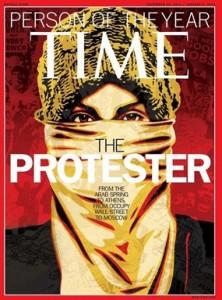 Time has (not) picked its 2011 Person of the Year: “The Protestor.” This marks the 85th time the magazine has published the annual special, beginning in 1927 with famed aviator Charles Lindberg.
Time has (not) picked its 2011 Person of the Year: “The Protestor.” This marks the 85th time the magazine has published the annual special, beginning in 1927 with famed aviator Charles Lindberg.
Formerly known as “Man of the Year” until it was changed in 1999, Time has always struggled with the relevance and integrity of the distinction. The magazine has from the outset sought to grant the title to the individual who has “for better or for worse …done the most to influence the events of the year.” From the beginning, though, the award was a bit of a farce. Time’s editors gave the distinction to Lindberg in 1927 specifically because it had been roundly chastised for omitting him from their cover after his famed Trans-Atlantic voyage in May of that year. The award, then, was created to make up for that embarrassment and engender some good will with its readership and the mainstream American public.
Since that time, the award has alternated between global legitimacy and outright pandering. In 1950 it gave it to “The American Fighting-Man,” an empty jingoistic gesture that rang as cynically insincere to anybody with a triple digit IQ. They repeated the sentiment in 2003, this time riding the still cresting wave of post-9/11 patriotism. Except this time, it was “The American Soldier,” both to include both genders of and not sound like the title of a song played on a phonograph.
This year, it once again rode the sentiment of a fickle and easily distracted public and chose “The Protestor,” which encompasses the stateside “Occupy ______” protests, the Arab Spring, and others throughout the world that have made a significant impact on global events and domestic policy for the foreseeable future.
You might be wondering what, exactly, is up my craw with this pick. The problem I have with it is two-fold.
Continue reading »
Upcoming Events
There are no upcoming events.
Recent entries
- Goodbye, goodbye, goodbye…
- Listen to me LIVE as guest co-host of Alternative to Sleeping tonight at 10pm!
- Realtors: “WAAAAAAAAAHHHHHH” George Hearst III: “NONONOO SSSSHHH IT’S OKAY, it’s okay…here. Here’s a pacifier.” Kristi: “#oops.”
- Open Mic web series premiere tonight @ Lark Tavern
- Trust Me, You’re Going to Want to See This
on Twitter



